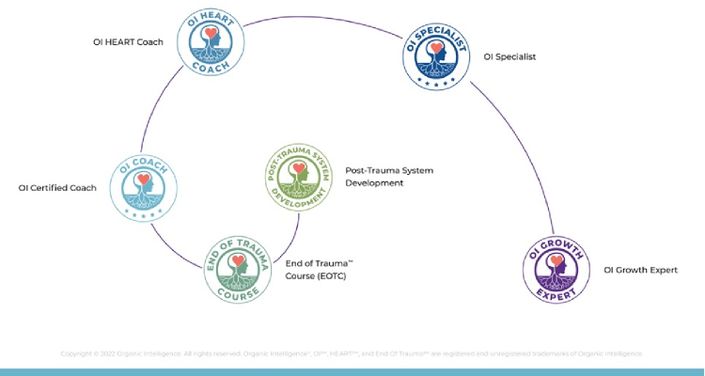
From Trauma to Post-Trauma Growth
Presented by:
Steven Hoskinson M.A. (Psychology), M.A.T. (Theology)
Founder of Organic Intelligence Training Programs
This course will not include CEs. Our upcoming recorded live events will be available HERE free for members and non-members who register for them, as is the case here. Members and event registrants can use their discount code to watch this event for free.
Description
The complex weave of the human experience asks us to be present, and to bring observational and interventional skills to each of these aspects: Image, Sensation, Orientation, Meaning, and Affect (ISOMA). This ISOMA framework, when well differentiated, helps reveal clients’ in-the-moment patterns of feeling and behaving. Within a clear container of relational attunement, fixated and maladaptive patterns are found to be equal parts challenge and gift. We’ll see how to elicit those habitual patterns and how we help cultivate and harvest their organic gifts. These gifts, rightly reinforced, grow a system into one which organizes itself into the ongoing mode of Post-Trauma Growth. A system so grown becomes a more capable, conscious, and compassionate human being.
While open to all, this workshop is intended for intermediate practitioners and above and will present video examples, therapeutic tools to start using right away, experiential learning, and a bonus gift.
The Main Points of This Workshop:
- The strange attraction of trauma
- Sources of unrecognized harm in treatment
- Breaking the neural habit of disorder
- Setting the context for organic healing
- Why doing less makes more sense
- Attuning to the person by recognizing the Phase of their biological organization
- How addiction and dysregulation have a common biological system root
Participants will learn:
- How to increase effectiveness and client safety by decreasing in-session intensity
- Assess a client’s organic resilience (vs their top-down management skills) using clear, observable somatic criteria
- Increase Post-Trauma Growth (PTG) tendencies with Free Association Conversations (FACs)
- Facilitate clients’ embodiment of unconscious impulses toward PTG
- Enhance attunement by using the tools “in Phase”—recognizing clients’ in-the-moment behaviors that guide attuned interventions
- Enhance the practitioner’s own sense of confidence, ease, and connection
Agenda
- Welcome
- USABP Announcements
- Presentation, Demo & Experiential
- Q & A
- Overtime discussion (after the event formally concludes)
Bibliography
Aldao A, Nolen-Hoeksema S, Schweizer S. (2010). Emotion-regulation strategies across psychopathology: A meta-analytic review. Clinical Psychology Review, 30(2):217–237.
Chester, D. S., Lynam, D. R., Milich, R., Powell, D. K., Andersen, A. H., & DeWall, C. N. (2016). How do negative emotions impair self-control? A neural model of negative urgency. NeuroImage, 132, 43-50.
Hoskinson, S., & Ho, B. (2022). A non-directive positive reinforcement framework for trauma and addiction treatment. International Body Psychotherapy Journal, 21(1). [Get this as a free download at www.OrganicIntelligence.org]
Levy, B. J., & Wagner, A. D. (2011). Cognitive control and right ventrolateral prefrontal cortex: reflexive reorienting, motor inhibition, and action updating. Annals of the New York academy of sciences, 1224(1), 40-62.
Measelle, J. R., Stice, E., & Springer, D. W. (2006). A prospective test of the negative affect model of substance abuse: moderating effects of social support. Psychology of Addictive Behaviors, 20(3), 225-233.
Kaiser, A. J., Milich, R., Lynam, D. R., & Charnigo, R. J. (2012). Negative urgency, distress tolerance, and substance abuse among college students. Addictive Behavior, 37(10), 1075-1083.
Course Curriculum
Video and Resources
Available in
days
days
after you enroll
Frequently Asked Questions
When does the course start and finish?
The course starts now and never ends! It is a completely self-paced online course - you decide when you start and when you finish.
How long do I have access to the course?
How does lifetime access sound? After enrolling, you have unlimited access to this course for as long as you like - across any and all devices you own.
What if I am unhappy with the course?
We would never want you to be unhappy! If you are unsatisfied with your purchase, contact us in the first 30 days and we will give you a full refund.
